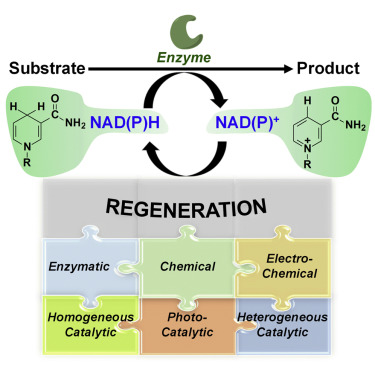EnzymoGenius™, our advanced enzyme AI design platform, specializes in tailoring solutions for Cofactor Engineering to meet your unique needs in drug synthesis and biomanufacturing. We harness the power of AI to provide customized solutions for scientific purposes.
Background
Cofactor Engineering represents a cutting-edge approach to revolutionizing drug synthesis and biomanufacturing in the realm of scientific exploration. In the intricate world of biocatalysis, these indispensable entities play a pivotal role. Enzymes are the biological catalysts that accelerate chemical reactions, while cofactors serve as coenzymes, supporting enzymes in their catalytic functions. These compounds are instrumental in diverse biological processes and have become indispensable tools in the synthesis of pharmaceutical compounds.
 Fig 1. Cofactor NAD(P)H regeneration inspired by heterogeneous pathways. (Wang X, et al., 2017)
Fig 1. Cofactor NAD(P)H regeneration inspired by heterogeneous pathways. (Wang X, et al., 2017)
The dawn of the AI era has ushered in a new era of precision and efficiency in the design of Cofactor Engineering. This groundbreaking technology is poised to redefine the landscape of biocatalysis, enabling tailored solutions for drug synthesis and biomanufacturing. AI design transcends conventional methodologies by harnessing computational power to optimize enzyme and cofactor performance, ultimately offering unparalleled control over the synthesis process.
How We Can Help?
1. Optimizing Enzyme Sequences. AI-driven design begins with the meticulous optimization of enzyme sequences. Through advanced algorithms and computational modeling, enzymes can be tailored to meet the specific demands of drug synthesis. This includes enhancing substrate affinity, selectivity, and overall catalytic efficiency.
2. Cofactor Engineering. Our platform specializes in the strategic engineering of cofactors, a critical aspect of enzyme functionality. AI algorithms assist in the modification and augmentation of cofactor properties, ensuring compatibility with target reactions and substrates.
3. Reaction Pathway Optimization. AI-driven design extends to the optimization of reaction pathways. This involves identifying the most efficient routes for chemical transformations, minimizing byproducts, and maximizing product yields.
4. Bioprocess Integration. We offer comprehensive services for the seamless integration of AI-designed enzymes and cofactors into biomanufacturing processes. This includes process scale-up, reactor design, and continuous monitoring to ensure consistent product quality.
5. Environmental Impact Assessment. Our platform also provides insights into the environmental impact of biomanufacturing processes, helping to develop more sustainable and eco-friendly solutions.
With a focus on precision, efficiency, and sustainability, EnzymoGenius™ is at the forefront of advancing scientific research in the biocatalysis field. Unlock the potential of enzyme-based solutions in drug synthesis and biomanufacturing with our enzyme AI design platform. Contact us today to explore how our cutting-edge techniques and services can support your scientific endeavors.
Reference
- Wang, X.; et al. Cofactor NAD (P) H regeneration inspired by heterogeneous pathways. Chem. 2017, 2(5): 621-654.

































 Fig 1. Cofactor NAD(P)H regeneration inspired by heterogeneous pathways. (Wang X, et al., 2017)
Fig 1. Cofactor NAD(P)H regeneration inspired by heterogeneous pathways. (Wang X, et al., 2017)